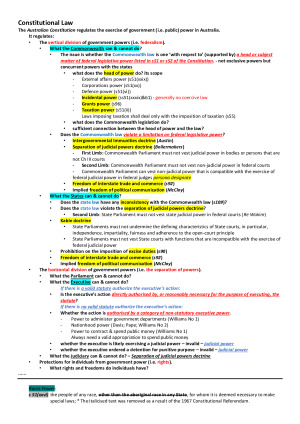LAWS50028 Constitutional Law 2021 - H1 Notes & Full Notes & Exam Notes
Subject notes for UniMelb LAWS50028
Description
This note served me well in the final exam and got me a H1. This note is structured to help tackle the Week1-4 interim assessment (focusing on the understanding of different judgements and the distinguishments between the analytical methods & arguments of different judges) and the Week5-12 final exam questions. At the same time, it covers all of the topics discussed in the readings, textbook, pre-class recordings and tutorials no matter how trival the topics are. I believe that the most important point for scoring high marks in this subject is to quickly spot issues based on different facts. So, this note provides a systematic organization of the principles of the different cases and the nuances between the facts to which they apply. Please do not read this note mechanically, but try to use it skillfully in specific hypos. Covered Topics: 1 The vertical division of government powers (ie federalism). 1-1 What the Commonwealth can & cannot do? 1-1-1 The issue is whether the Commonwealth law is one ‘with respect to’ (supported by) a head or subject matter of federal legislative power listed in s51 or s52 of the Constitution. - not exclusive powers but concurrent powers with the states • what does the head of power do? its scope - External affairs power (s51(xxix)) - Corporations power (s51(xx)) - Defence power (s51(vi)) - Incidental power (ss51(xxxix)&61) - generally no coercive law - Grants power (s96) - Taxation power (s51(ii)) Laws imposing taxation shall deal only with the imposition of taxation (s55) • what does the Commonwealth legislation do? • sufficient connection between the head of power and the law? 1-1-2 Does the Commonwealth law violate a limitation on federal legislative power? • Intergovernmental Immunities doctrine (Austin) • Separation of judicial powers doctrine (Boilermakers) - First Limb: Commonwealth Parliament must not vest judicial power in bodies or persons that are not Ch III courts - Second Limb: Commonwealth Parliament must not vest non-judicial power in federal courts - Commonwealth Parliament can vest non-judicial power that is compatible with the exercise of federal judicial power in federal judges persona designate • Freedom of interstate trade and commerce (s92) • Implied freedom of political communication (McCloy) 1-2 What the States can & cannot do? • Does the state law have any inconsistency with the Commonwealth law (s109)? • Does the state law violate the separation of judicial powers doctrine? - Second Limb: State Parliament must not vest state judicial power in federal courts (Re Wakim) • Kable doctrine - State Parliaments must not undermine the defining characteristics of State courts, in particular, independence, impartiality, fairness and adherence to the open-court principle - State Parliaments must not vest State courts with functions that are incompatible with the exercise of federal judicial power • Prohibition on the imposition of excise duties (s90) • Freedom of interstate trade and commerce (s92) • Implied freedom of political communication (McCloy) 2 The horizontal division of government powers ( the separation of powers). 2-1 What the Parliament can & cannot do? 2-2 What the Executive can & cannot do? If there is a valid statute authorize the executive’s action: • Is the executive’s action directly authorised by, or reasonably necessary for the purpose of executing, the statute? If there is no valid statute authorize the executive’s action: • Whether the action is authorised by a category of non-statutory executive power. - Power to administer government departments (Williams No 1) - Nationhood power (Davis; Pape; Williams No 2) - Power to contract & spend public money (Williams No 1) Always need a valid appropriation to spend public money • whether the executive is likely exercising a judicial power – invalid – judicial power • whether the executive ordered a detention for punitive purpose – invalid – judicial power 2-3 What the Judiciary can & cannot do? – Separation of judicial powers doctrine 3 Protections for individuals from government power (ie rights). • What rights and freedoms do individuals have?
UniMelb
Semester 2, 2021
64 pages
52,807 words
$54.00
32
Campus
UniMelb, Parkville
Member since
January 2020
